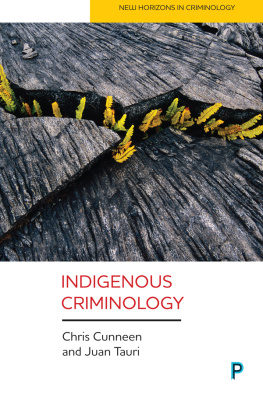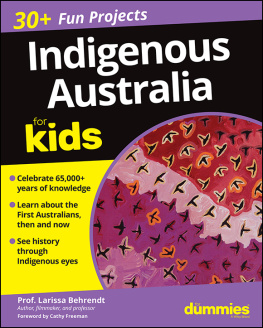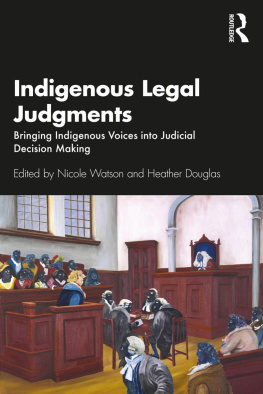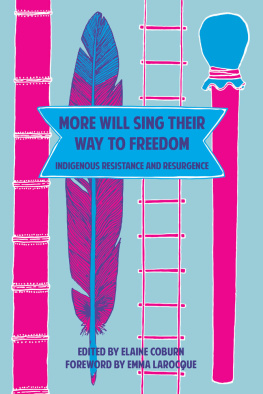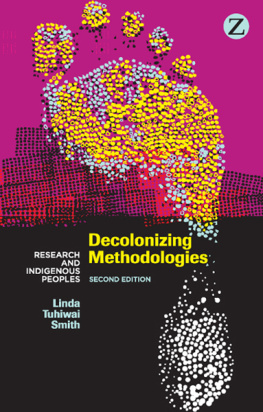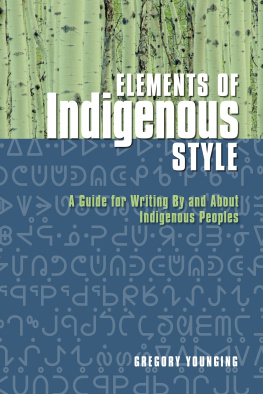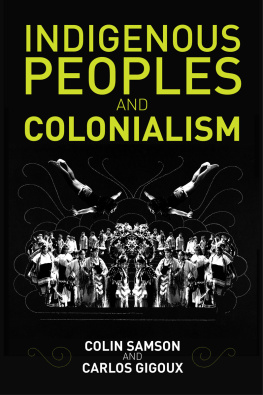NEW HORIZONS IN CRIMINOLOGY
INDIGENOUS CRIMINOLOGY
Chris Cunneen and Juan Tauri
First published in Great Britain in 2016 by
Policy Press University of Bristol 1-9 Old Park Hill Bristol BS2 8BB UK Tel +44 (0)117 954 5940 e-mail
North American office: Policy Press c/o The University of Chicago Press 1427 East 60th Street Chicago, IL 60637, USA t: +1 773 702 7700 f: +1 773-702-9756 e:
Policy Press 2016
British Library Cataloguing in Publication Data
A catalogue record for this book is available from the British Library
Library of Congress Cataloging-in-Publication Data
A catalog record for this book has been requested
ISBN 978 1 44732 175 0 hardcover
ISBN 978-1-4473-2179-8 ePub
ISBN 978-1-4473-2180-4 Mobi
The right of Chris Cunneen and Juan Tauri to be identified as authors of this work has been asserted by them in accordance with the Copyright, Designs and Patents Act 1988.
All rights reserved: no part of this publication may be reproduced, stored in a retrieval system, or transmitted in any form or by any means, electronic, mechanical, photocopying, recording, or otherwise without the prior permission of Policy Press.
The statements and opinions contained within this publication are solely those of the authors and not of the University of Bristol or Policy Press. The University of Bristol and Policy Press disclaim responsibility for any injury to persons or property resulting from any material published in this publication.
Policy Press works to counter discrimination on grounds of gender, race, disability, age and sexuality.
Cover design by Policy Press
Front cover image: www.alamy.com
Readers Guide
This book has been optimised for PDA.
Tables may have been presented to accommodate this devices limitations.
Image presentation is limited by this devices limitations.
Contents
About the authors
Chris Cunneen is Professor of Criminology in the Faculties of Law, and Arts and Social Sciences, University of NSW, Sydney, Australia. He has an international reputation as a leading criminologist specialising in juvenile justice, restorative justice, policing, prison issues, human rights, and Indigenous people and the law. Chris has participated in a number of Australian Royal Commissions and Inquiries and with the federal Australian Human Rights Commission. He also holds a conjoint position with the Cairns Institute at James Cook University, Australia. He is a Fellow of the Academy of Social Sciences in Australia. His recent books include (with Brown et al) Justice Reinvestment. Winding Back Imprisonment, Palgrave MacMillan, 2016, and (with Baldry, et al) Penal Culture and Hyperincarceration, Ashgate, 2013.
Juan Tauri is a member of the Ngati Porou iwi (First Nation) of Aotearoa New Zealand, and a lecturer of criminology in the Faculty of Social Science, University of Wollongong, Wollongong, Australia. Juan is an established researcher and scholar on Indigenous justice issues, with a focus on Indigenous critique of crime control in settler-colonial jurisdictions, and state responses to Indigenous over-representation. He has recently completed research on white privilege and racism in academic criminology, and is currently undertaking research on race, ethnicity and restorative justice.
Acknowledgements
The authors have been engaged in critical scholarship, advocacy and activism for Indigenous peoples over many decades. This book is the result of those endeavours. Not surprisingly many intellectual debts have arisen along the way. As a non-indigenous researcher, Chris Cunneen would like to especially acknowledge the support and knowledge he has gained from working with Indigenous communities and organisations, particularly Aboriginal Legal Services and various Aboriginal and Torres Strait Islander Social Justice Commissioners. Juan Tauri would like to acknowledge the Indigenous academics and activists Moana Jackson and Biko Agozino whose work has provided theoretical and methodological nourishment for his work over the past twenty years.
We acknowledge the work done by Simone Rowe who provided research for various sections of this book.
We dedicate this book to our two youngest children both of whom were born during the time the manuscript was being written: to Ruben and Coco.
NEW HORIZONS IN CRIMINOLOGY
Series editor: Professor Andrew Millie, Department of Law and Criminology, Edge Hill University, UK
Preface
Policy Presss New Horizons in Criminology book series provides concise authoritative texts that reflect cutting-edge thought and theoretical developments in criminology and have an international scope. These short, accessible texts are written so that the non-specialist academic, student or practitioner can understand them, by explaining principles and developments clearly before going deeper into the subject. Written by leading authors in their fields, the series will become essential reading for all academics and students (and practitioners) interested in where criminology is heading.
When I first proposed a series on New Horizons, one criminologist suggested that criminology does not need any more criminologies. The subject of criminology has expanded so much over recent years that perhaps it should have time to draw breath growing from a smallish cottage industry (Loader and Sparks, 2012, p 4) to the extent that most universities now offer criminology and/or criminal justice at undergraduate or postgraduate levels. Yet, my reply was that without exploring new areas of enquiry, the subject could stagnate. If criminologists had not been willing to explore new horizons, there would not have been the expansion from conventional crime and justice issues into important research on, for example, state crimes, social harms, green issues or cultural identity, as reflected in new criminologies such as green criminology and cultural criminology. For any discipline to remain vibrant it needs to explore new areas and, where relevant, to draw on other disciplines and investigate innovative methodologies. This does not mean that the past is cast aside. Instead, by exploring new horizons, light might be reflected back onto criminologys traditional core. The criminological imagination (see Young, 2011) continues to expand, with new approaches being adopted by criminologists, and criminological approaches being relevant to new areas of study. This book series aims to reveal to a wider audience these cutting-edge developments.
I am delighted that one of the first books in the series is on the important topic of Indigenous criminology and that this book is authored by Chris Cunneen and Juan Tauri, two of the leading authors in this area of study. Indigenous peoples are over-represented within the criminal justice systems of settler colonial states such as Canada, the US, Aotearoa New Zealand and Australia, yet are also under-represented within discussions of criminology, except perhaps within certain aspects of restorative justice. Chris Cunneen and Juan Tauris work is both accessible and challenging. This book contributes to a decolonising of criminology, by defying the status quo and arguing for the prioritisation of Indigenous voices. It ought to be essential reading for criminologists (and many others) from countries with colonising or settler histories.
References
Loader, I. and Sparks, R. (2012) Situating criminology: On the production and consumption of knowledge about crime and justice, in M. Maguire, R. Morgan and R. Reiner (eds)

